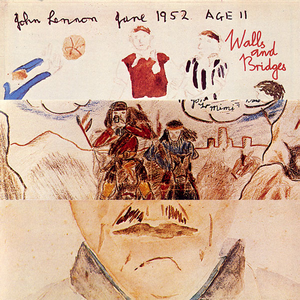“Going Down On Love” starts off in a similar way to “I Found Out” (from Plastic Ono Band) in the way the voice sings along with the guitar. While it’s got several sections seemingly stuck together, for the most part they succeed, especially “somebody please please please help me”. “Whatever Gets You Thru The Night” is the mindless single, where John’s voice meshes perfectly with Elton John’s and one begins to get really tired of saxophones. “Old Dirt Road” was written with Harry Nilsson but is very similar to an oldie called “Cool Clear Water”; it’s very pretty, especially Jesse Ed Davis’s underwater guitar and the Nicky Hopkins piano, whatever it’s about. “What You Got” is fairly straightforward, but all the funk unfortunately adds to the dated sound of the album today. “Bless You” is incredibly gracious towards the woman who left him all alone, right down to the very subtle switch in the third verse that refers to her new lover. This tone of resigned acceptance is crushed by the howling that starts off “Scared”, a thoroughly frightening tune that also recalls Plastic Ono Band with its pounding, unrelenting piano.
“#9 Dream” starts off side two, and is one of his best. Its dreamy quality is very close to “Strawberry Fields”, but this is a pleasant sleep as opposed to a nightmare. “Surprise Surprise (Sweet Bird Of Paradox)” was supposedly inspired by his newfound bachelorhood. The cowbell and especially the “sweet-sweet” at the fade bring to mind “Drive My Car”. “Steel And Glass” seeps up from the sewer much like the subject of the song (allegedly latter-day Beatle manager Allen Klein). The verses are great and nasty, but what exactly does “steel and glass” refer to? Office buildings? The production is suitably eerie, with Jesse Ed’s gurgling guitar and all. “Beef Jerky” is a full-fledged but anticlimactic instrumental, related to “Meat City” from the last album with its occasional tempo twists and turns. John didn’t do instrumentals often, and this is why. “Nobody Loves You (When You’re Down And Out)” is another example of how he could take the simplest chords and make complete unique statements around them. (This tune should prove to the critics that his songs don’t only apply to himself; after all, it’s true, everybody does love you when you’re six foot in the ground.) He whistles his way off under the streetlamps, coat slung over his shoulder. In order to leave us with some levity, the album ends with a short stab at “Ya Ya”, with Julian playing drums badly.
Walls And Bridges is still a satisfying album today, with more meat to it than Mind Games had. He waited until he had something to say, and the result was something of a comeback. It was great to hear he could still write songs, plus his sense of humor is all over the packaging. But outside of two detours through his past, this would be John’s last new album for six years. (The remaster added one live track already available elsewhere, a negligible alternate take and an interview snippet. Yoko also altered the packaging, which took the cover even further away from the clever fold-out aspects of the original LP jacket. 2010’s Signature Edition rectified this somewhat, albeit without any extra tracks.)
John Lennon Walls And Bridges (1974)—3½
2005 remaster: same as 1974, plus 3 extra tracks

I love Going Down on Love. But man, I do not like the production on this album. It seems all his albums after Plastic Ono Band are over-produced (kinda ironic given the direction Paul took in the early 70s). The versions of these songs on Menlove Ave and Anthology are better to me.
ReplyDelete